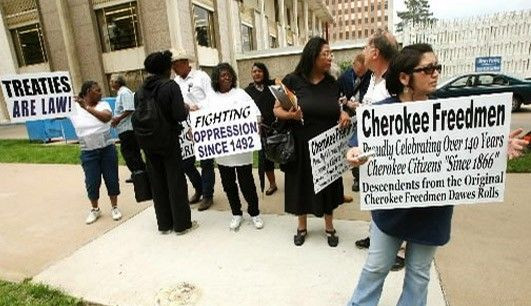Cherokee Nation Expels Slave Descendants, U.S. Government Threatens to Revoke Funding

The Cherokee Nation, the nation's second-largest Native American Tribe, said earlier this week that it will not be dictated by the U.S. government over it decision last month to revoke tribal citizenship from more than 2,800 African Americans.
The Cherokee Nation will not be governed by the BIA, Joe Crittenden, the tribe's acting principal chief, said in a statement responding to the U.S. Bureau of Indian Affairs.
On Monday, the tribe received a letter from BIA Assistant Secretary Larry Echo Hawk, who warned that the results of a Cherokee election for principal chief, scheduled for Sept. 24, will not be recognized by the U.S. government if the ousted tribesmen are not allowed to vote.
The decision to withdraw Cherokee citizenship from the thousands of African American tribesman will cut off their medical care, food stipends, low-income homeowners' assistance and other services.
The Cherokee Nation acted after its Supreme Court upheld the results of a 2007 special vote to amend the tribe's constitution to remove slaves' descendants as well as other non-Indians from its tribal rolls.
While the Cherokee tribe itself did not own slaves, some of its individual members did in the 19th century. By the 1830's, most of the Cherokee were forced by the U.S. government to relocate to Oklahoma, and many took their slaves with them. The present day African Americans are the descendants of those slaves.
The 1866 treaty between the U.S. government and Cherokee Nation guaranteed that the slaves, known to some as the Cherokee Freedmen, were given tribal citizenship, whether or not they had a Cherokee blood relation.
However, more than 76 percent of Cherokee voters approved the amendment that stripped the Freedman descendants of their citizenship, according to The Associated Press. Former Principal Chief Chad Smith said the vote was not about racial exclusion, but the fundamental right of every government to determine its own citizens.
However, some of the black tribesman who have always lived among the Cherokee disagree.
It's a red man, black man issue just like it's a white man, black man issue, Raymond Nash, a Freedman descendant, told The AP. It's embarrassing, really. It should have been over a long time ago.
Marilyn Vann, the president of the Descendants of the Freedman of the Five Civilized Tribes, expressed similar sentiments.
The attitude is more like, 'We can't put them in chains, so we'll do anything we can to take away their rights.' It's a matter of racism and politics, she told the source.
Federal lawmakers who believe the decision has violated the civil rights of the black tribesman have lobbied federal agencies to cut funding to the Cherokee. While the U.S. Department of Housing and Urban Development temporarily froze $33 million in funds while it evaluates the issue, U.S. Rep. Dan Boren (D-Okla.) told the Tulsa World that HUD has overstepped its bounds. Boren claims a provision he helped amend in a housing reauthorization bill several years ago does not allow the HUD to lawfully deny funding to the tribe.
Despite the stubbornness of both sides, there is an indication that the situation may be resolved sooner rather than later. On Wednesday, Cherokee Nation Attorney General Diane Hammons told the Tulsa World that a reconsideration of the Supreme Court ruling may, be in the best interest of the nation.
© Copyright IBTimes 2025. All rights reserved.




















